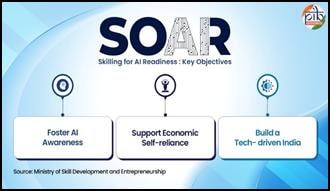




The global workforce is undergoing a profound transformation driven by advances in AI, machine learning, data science, and automation. As AI becomes embedded in industries such as healthcare, finance, education, manufacturing, and public services, there is an urgent need for broad-based AI literacy and specialised talent. The Skilling for AI Readiness (SOAR) program in India represents a strategic initiative by the Ministry of Skill Development and Entrepreneurship (MSDE) to integrate artificial intelligence competencies into India's educational framework. This aligns with the government’s goal to lead in global technological advancements. Launched in July 2025, this program coincides with the 10-year milestone of the Skill India Mission, which has empowered people through various skilling schemes since 2015, including expansions into emerging domains like AI under the Pradhan Mantri Kaushal Vikas Yojana (PMKVY) 4.0.
SOAR’s Mission: Empowering the Future


Artificial Intelligence: Transforming India’s Education Landscape
Artificial Intelligence is revolutionising India’s education sector by fostering innovation, enhancing digital literacy, and preparing students for a technology-driven future. In line with the recommendations of the National Education Policy (NEP) 2020, AI is being seamlessly integrated into classrooms and skill development frameworks. Some of the key developments driving this transformation include:

The National Education Policy (NEP) 2020 emphasises the inclusion of contemporary subjects like Artificial Intelligence (AI) in school curricula, at appropriate stages, to foster innovation and digital literacy among students.The Central Board of Secondary Education (CBSE) has already implemented AI as a subject in affiliated schools. Introduced in Class IX starting from the 2019-2020 academic session and extended to Class XI from the 2020-2021 session, it focuses on practical applications like skill development and personalised learning tools.
The Government of India is establishing a Centre for AI Excellence as a key initiative to advance AI adoption in education. The aim is to leverage AI for Indian languages, promoting critical thinking in classrooms, and transitioning from traditional teaching methods to technology-driven approaches like "from chalkboards to chipsets."
This centre will support broader national efforts to build AI infrastructure and human resources. This also includes recommendations for All India Council for Technical Education (AICTE)-approved institutions to offer AI as an elective in various educational courses.
Indian Institutes of Technology (IITs) complement this by offering advanced AI-related courses, such as Deep Learning, Machine Learning, and Predictive Data Analytics.
The Government of India is actively embedding AI and digital learning programs within the Skill India Mission (SIM) to prepare a future-ready workforce, with targeted initiatives under Pradhan Mantri Kaushal Vikas Yojana (PMKVY) 4.0, National Apprenticeship Promotion Scheme (NAPS), Industrial Training Institutes (ITIs) and National Skill Training Institutes (NSTIs)and the Skill India Digital Hub (SIDH) platform.
 PMKVY 4.0: Launched in 2015 and focuses on short-term training, up-skilling, and recognition of prior learning by prioritising futuristic skills like Artificial Intelligence (AI).
PMKVY 4.0: Launched in 2015 and focuses on short-term training, up-skilling, and recognition of prior learning by prioritising futuristic skills like Artificial Intelligence (AI).


NAPS: Since August 2016, the National Apprenticeship Promotion Scheme (NAPS-2), currently in its second phase, supports apprenticeships


SOAR: Relevance and Expected Outcomes
Strategic Alignment with Skill India Mission: SOAR supports the Skill India Mission by providing targeted modules for students, equipping the youth with essential digital skills to enhance employability and productivity in AI-driven sectors.
Contribution to Viksit Bharat Vision: The program advances India's vision of a developed nation by 2047 through AI for All initiatives. This fosters a tech-savvy workforce that leverages AI to boost innovation and global competitiveness, as emphasised in national skill development strategies.
Promotion of Digital Inclusion: SOAR bridges the urban-rural digital divide by integrating AI training into accessible platforms like the Skill India Digital Hub. This ensures equitable access to digital skills across government and private schools, thereby empowering marginalised communities.
AI-Aware Students and Trained Educators: SOAR aims to produce AI-aware students capable of ethical AI application and train educators across government and private schools in enhancing teaching methodologies and ensuring widespread adoption of AI in classrooms.
Boosting AI Career Interest and Narrowing Skill Gaps: The SOAR program is projected to increase youth interest in AI careers through hands-on skilling. It also narrows the urban-rural gap in digital competencies by providing inclusive training and enabling access to high-demand tech skills.
Conclusion
The Skilling for AI Readiness (SOAR) program marks a pivotal step toward positioning India as a global leader in AI-driven education and workforce development. By embedding AI literacy within school curricula and vocational training, SOAR not only equips students and educators with cutting-edge skills but also fosters a culture of innovation and ethical technology use. Through strategic partnerships and platforms like the Skill India Digital Hub, the program ensures accessibility across diverse socio-economic groups, empowering India’s youth to drive technological and economic progress. As a cornerstone of the Viksit Bharat @ 2047 vision, SOAR lays the foundation for a digitally inclusive, competitive, and self-reliant India, ready to shape the future of global innovation.



